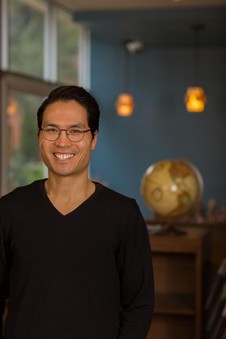
As the founder of Airbnb in Latin America, Christian Gessner spent years helping millions of wanderlusts find homes while traveling. Now, the globally minded entrepreneur has found a new home of his own — Biola’s Talbot School of Theology, where he’s seeking a biblical foundation for a new gospel-focused online venture.
Gessner, born and raised in Germany, with a German father and a mother who was born in South Korea, is a self-described global citizen. In 2006, he went on an adventure with two friends and traveled to 12 countries within the span of two months, spending 10 days in Brazil. After that trip, he knew he had to go back to Brazil to consider living and working there. To keep the experience fresh in his mind, he put up a photo of Cristo Redentor, the Christ the Redeemer monument that overlooks Rio de Janeiro. He even started learning Portuguese. He eventually worked and lived in Brazil for nearly a decade and became the founder and country manager for Airbnb in Latin America.
With a background in business and a doctorate in innovation management, Gessner has always felt a strong calling to be an entrepreneur. While at Airbnb between 2011 and 2015, he sensed the Lord planting a seed in his heart to begin a new venture: faceGodnow, a global platform to reach non-believers.
He hopes to create an online platform that focuses specifically on reaching a population who have yet to hear the gospel, to plant seeds and lead individuals in discovering and growing their faith.
“The church completely under-leverages the internet and what it could be,” said Gessner, now at Talbot pursuing a master’s in biblical and theological studies. He, along with his wife and son, are experiencing the joys of being part of Biola’s community. Gessner said he chose to study at Biola because it was a great fit for both him and his family, and because he knew this place would help him grow in his spiritual maturity.
“I always say it feels like a revolution for me because I am in awe and amazed by what Biola offers in terms of spiritual formation,” he said.
 Biola University
Biola University
.jpg)

